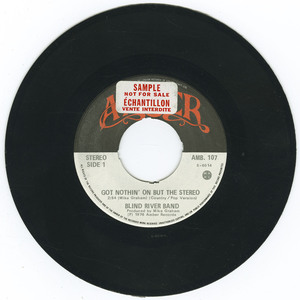Blind River Band
Websites:
https://citizenfreak.com/artists/95919-graham-mike
Origin:
Toronto → London, Ontario, 🇨🇦
Biography:
Toronto-born Michael Dee Graham built a career on movement, reinvention, and a natural ease with audiences that carried him from rockabilly stages to country charts, from Montreal radio booths to national CBC television. He arrived in the early 1960s with a strong voice, a quick sense of humour, and a performer’s instinct that allowed him to slip from one musical identity to another without ever losing his grounding. When he moved from Toronto to Montreal in the early part of the decade, it was not as a band member but as a young entertainer and radio personality, soon becoming a familiar voice on CHOM and developing the high-energy persona that earned him the nickname “Canada’s Rockabilly King.” The Montreal period was where he found his confidence as both a singer and a communicator, sharpening the charisma he would later bring fully into the country market.
By the mid-1960s he shifted toward country music, a transition that broadened his emotional range and set him up for the decade of national visibility that followed. He eventually made London, Ontario his home base and, under the name Michael Dee, became one of the most recognizable voices on BX-93. His warm delivery, wit, and easy rapport gave him a deep connection to listeners across Southwestern Ontario, and his local popularity expanded further through a weekly program on CFPL-TV. That combination of radio and television exposure positioned him perfectly for the next phase of his career, when CBC hired him to co-host the final season of Countrytime with Myrna Lorrie in 1973 and 1974. It was his largest national platform to date and showed how naturally he could hold a camera’s attention.
His recording career grew steadily alongside his broadcasting work. Between 1970 and 1980 he placed nineteen singles on the RPM country charts, an impressive run that included three Top Ten hits. His revival of Johnny Horton’s “Battle of New Orleans” gave him one of his earliest national successes, while in 1979 his tender version of Elvis Presley’s “Loving You” reached number six and became the single most associated with him during the later peak of his career. His albums appeared on an array of Canadian labels including Banff, Rodeo, United Artists, GRT, Amber, Boot, ATI, and later his own Northern Gold imprint, which he used to record, publish, and promote both his material and the work of other artists. He could slip easily between identities as circumstances required, releasing material as Mike Graham, Michael Dee Graham, Michael Dee, and, for certain projects, Kyle Cody. Much of the material on his albums came from his own pen, earning him a reputation as a sturdy songwriter with an instinct for direct, melodic phrasing. Songs like “Lonely Cabdriver,” “Shadow of a Man,” “Then Came You,” “Till the Minute You Go,” and “Would You Still Love Me” all charted during this period and helped solidify his national profile.
In the midst of his Amber Records period, Graham also stretched into studio-band productions, writing and producing the 1976 single Got Nothin’ On But the Stereo for the Blind River Band, a Toronto studio outfit he led behind the scenes.
His most enduring achievement as a writer arrived in 1991 when American singer Billy Joe Royal recorded his composition “If the Jukebox Took Teardrops,” turning it into a Top Thirty Billboard country hit. The Canadian release climbed into the national Top Twenty and gave Graham a rare and satisfying moment of international recognition. Long before that success, however, he had already shown that he could deliver compelling material outside the standard country framework. His CTL album Here I Am Again, produced by Gary Buck, showcased a versatile vocalist supported by the elegant piano and arrangements of John Arpin, while his Banff album Momento of Manitoulin captured the warmth he brought to the songs of Arthur Schaller, turning regional stories into something broader and emotionally lasting.
What audiences seemed to love most, though, was the showman. On stage he mixed his own material with established country hits and comic impersonations that delighted audiences across Ontario and the Prairie provinces. His humour was never cruel, always affectionate, and carried the same warmth he brought to his radio work. That generosity extended into the community as well. He was a steady presence at fundraising events for Easter Seals, the Sunshine Foundation, the Kidney Foundation of Canada, the Canadian Cancer Society, and numerous smaller charities, where he treated his role less as a duty and more as a privilege.
Mike Graham’s life was rich in motion and expression, anchored by the desire to reach people in whatever medium he touched. He moved fluidly between performer, broadcaster, songwriter, and promoter, and at every point brought sincerity, craft, and charm to the work. He died in London, Ontario on August 18, 1993 at only forty-eight, leaving behind a catalogue of recordings, a generation of radio listeners who felt they knew him personally, and a legacy defined by versatility, dedication, and an unmistakable warmth that still registers in the grooves of the records he made.
-Robert Williston

